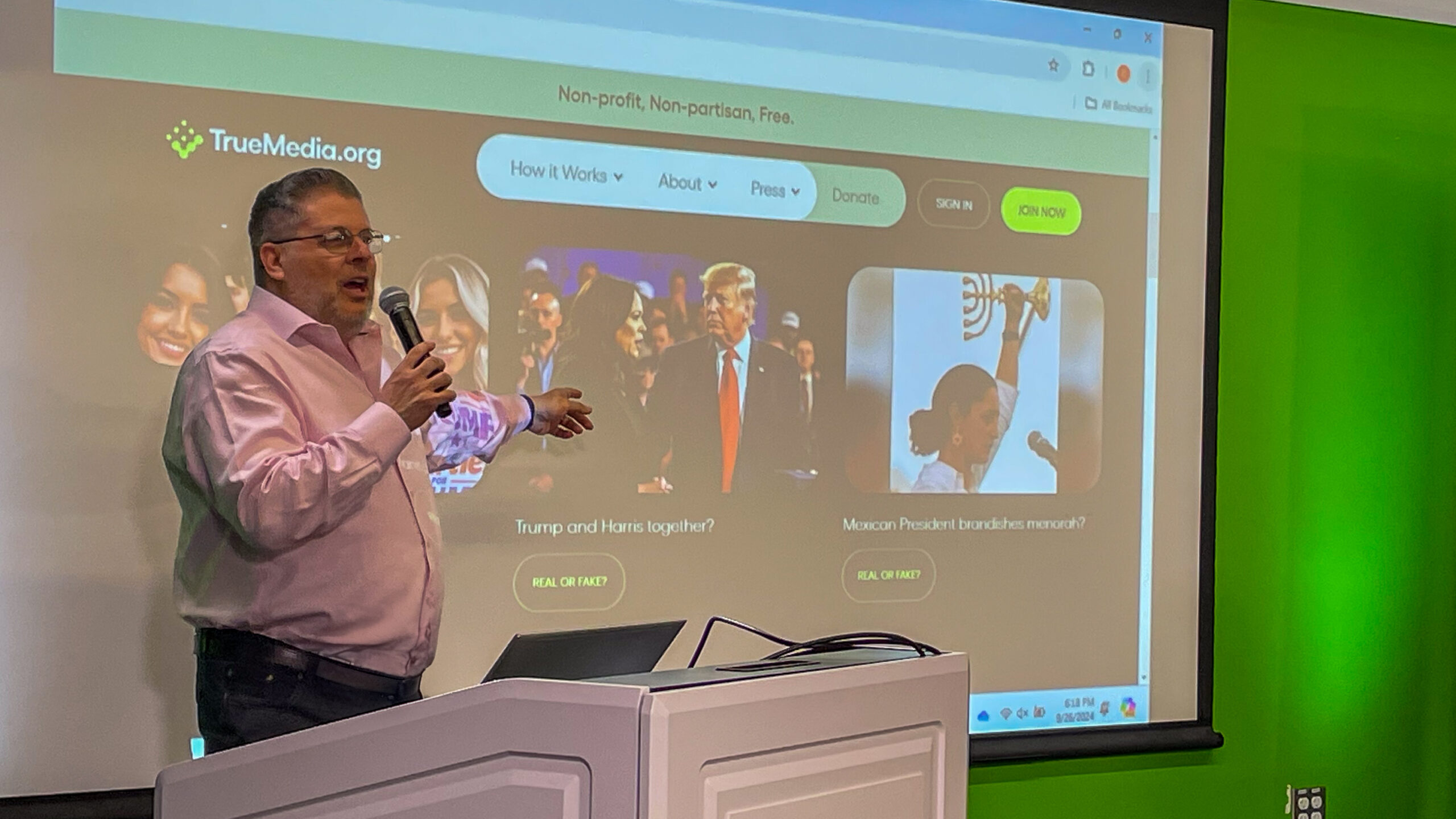UW computer scientist talked about AI and political misinformation at Startup Hall

Computer scientist Oren Etzioni demonstrates TrueMedia.org, a tool that detects political deepfakes.
This year is the first presidential election cycle since generative AI tools went mainstream. And as Election Day nears, we’re seeing an uptick in AI-generated deepfakes designed to warp political discourse.
The third installment of Start Something, a conversation series powered by CoMotion Labs, in September brought our startup community together to dive into these issues. Tech journalist Katherine Long interviewed Oren Etzioni, professor emeritus of computer science at UW, about TrueMedia.org, the nonprofit website he founded to detect political deepfakes, and the power of AI in fueling innovation.
These are edited excerpts from that conversation.
Katherine Long: You were once incredibly optimistic about AI. But in 2017, you wrote an op-ed for the New York Times urging guardrails on AI. What changed?
Oren Etzioni: When we look at AI technology, we have to be balanced. There are still great things happening. I’m still an AI optimist, and I’ll give you one quick example: Self-driving cars. Forty thousand deaths occur each year on American highways alone. The potential to save lives is enormous.
Over the years, I’ve also become aware of the potential downsides. As a technologist, you don’t always want to think about that, but there are issues around jobs, privacy, bias, and, as I’m working on right now, disinformation.
What’s changed is that the technology started working. When you have working technology—whether it’s a power drill or AI—it’s a tool that can be used for good or bad. I like to say AI is a tool, and the choice is ours. It’s now time for us, as a society, to make good choices.
KL: Your most recent project, True Media, is an AI-powered tool for identifying the likelihood that a piece of media is a deepfake. How did you come to this work?
OE: In 2023 there was a small meeting of AI experts with President Biden and some of his key team members. I came out of that meeting with a very serious concern about how democracy intersects with social media and AI-generated content. The basic concern is that we can no longer tell what’s real and what’s fake, and things spread so quickly on TikTok, Instagram, and other platforms. That combination can be very toxic, especially in an election year.
I realized that in 2024, something like two billion people will be going to the polls in places like Indonesia, India, Pakistan, the EU, the UK, Brazil, and, of course, here in the US. Many of these elections are close, and I started wondering: Could deepfakes sway people? Could they erode trust and dissuade people from voting?
Now we have a simple website, TrueMedia.org, which is accessible on your phone. You can upload a URL or media file and within a minute or so, you’ll get an assessment. We consistently have over 90% accuracy. That’s the good news. The bad news is that 90% still means we make plenty of errors. We’re not perfect, but it’s still an extremely useful tool, much like weather forecasts or search engines. And we employ human analysts for verification.
KL: What advice would you give someone interested in starting an AI-based company?
OE: The most important message I have for you on this topic is actually the name of this series: Start Something.
We hear so much about what’s not working today—whether it’s climate, politics, or the entrepreneurial ecosystem—but the entrepreneurial ecosystem continues to be incredibly vibrant and successful, so don’t give up on it.
People ask, “When should I start? Should I spend five years at Microsoft first?” My answer is: As soon as possible. Once you’ve got three kids and a mortgage, it becomes harder. Start earlier rather than later.
Second, why do it? Are we all going to be Mark Zuckerberg or Bill Gates or Jeff Bezos? No, but starting a company is the most exciting adventure I’ve ever engaged in professionally. It’s stressful and hard work, but if you want to make a difference in the world, start something.
KL: Do you think the pace of AI innovation is accelerating, decelerating, or staying the same?
OE: The pace of AI innovation has been accelerating for years and it continues to do so. There’s data to support that—publication rates and funding for AI companies are both on the rise. However, it’s important to distinguish between innovation and public perception. For example, many people were shocked by AlphaGo’s success and later ChatGPT, but those of us working in the field have been watching this exponential growth for years. I like to say that our “overnight success” with AlphaGo and ChatGPT has been decades in the making.
Sometimes people think AI is overrated because they expect immediate results. But I say, “Never mistake a clear view for a short distance.” Yes, we have a clear view of AI’s potential, but it’s still a long way from achieving general intelligence. The problems are hard, and hard problems create great opportunities for academics and startups alike.
Watch the full conversation on YouTube.